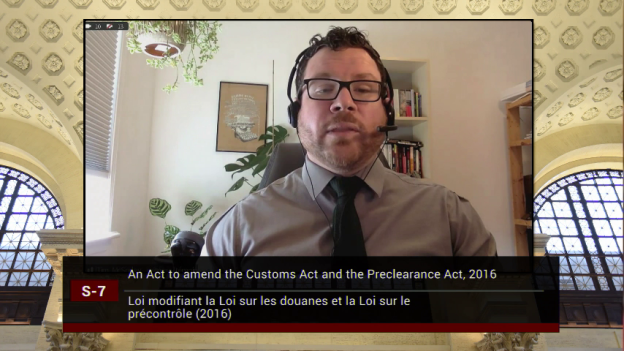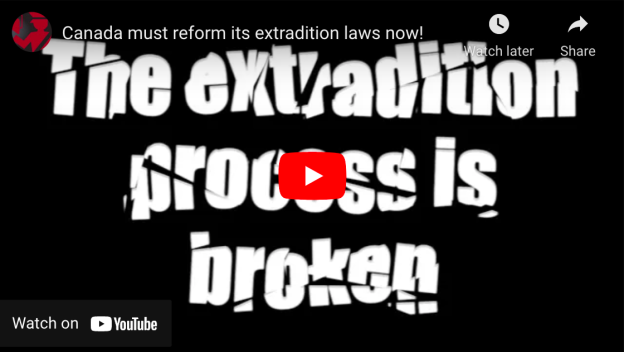It is imperative that senators reject the government’s proposed new threshold of “reasonable general concern” to allow Canadian border officers to search the cell phones and digital devices of Canadians and international travellers when they come to Canada. Such a threshold would grant border officers too broad a discretion in deciding whose devices to search and why, allowing for the violation of privacy rights. It would also allow for racial profiling and discrimination at the border to continue.
This was the message delivered by the ICLMG’s national coordinator at the June 1, 2022, Senate committee hearing on the proposed Bill S-7. Below is the full transcript of his remarks. Above, you can watch his.
Brenda McPhail of the CCLA and Meghan McDermott of the BCCLA also appeared at the meeting. You can watch their testimony and the full discussion with senators here.
Statement to the Standing Senate Committee on National Security and Defence (SECD) regarding Bill S-7, An Act to amend the Customs Act and the Preclearance Act, 2016
Tim McSorley, National Coordinator
International Civil Liberties Monitoring Group
Thank you honourable Senators for inviting me to speak to you today on behalf of the International Civil Liberties Monitoring Group in regards to Bill S-7. To begin, I’d like to make clear that we find the central provisions of this bill, the creation of a new threshold of “reasonable general concern” in order to search personal digital devices at the border, deeply worrisome, and we are strongly opposed to its adoption. In the next few minutes I will make clear why we are opposed, and propose an alternative. I’d also mention right away that, similar to my colleagues here today, and what we expect to appear in written briefs, there are other parts of this bill that deserve examination, and I hope they can be raised during our discussion today.
Every day, tens of thousands – and in pre-COVID times, hundreds of thousands – of Canadians and foreign travellers enter this country. Most of them will be carrying a cell phone, laptop, tablet, smartwatch or other personal digital device. Many will be carrying multiple devices. All of these devices carry troves of intimate information about the individual person, from health to financial to personal records. They also carry intimate information about the people in our lives – our family, friends, colleagues and more.
If any devices carry a reasonable expectation of privacy, these do. Much more so than a suitcase, purse or other piece of luggage.
The courts have recognized this, both in the Alberta Court of Appeal decision in R v. Canfield, but also in a recent Ontario Superior Court decision, and even in a 2021 immigration decision. What the courts have told us is clear: these devices cannot be searched without a reason.
The government’s solution is the creation of the novel threshold of “reasonable general concern.” As you’ll likely hear from my colleagues from the CCLA and BCCLA today, this proposed threshold is unacceptable for several reasons, and we support many of the concerns they will raise. We are expected to believe that a “reasonable general concern” will be based on specific, objective criteria, when the wording of the threshold indicates the exact opposite. At the same time, we are told that this new threshold will help codify the policies CBSA agents have already been following – and what the courts rejected as not meeting an adequate threshold.
Why should we be worried? On Monday, several Senators raised concerns about racial and religious profiling, including speaking powerfully about their own experience at the border. Our coalition’s specific mandate is around the impacts of anti-terrorism and national security on civil liberties in Canada. What we have documented over the past 20 years reflects the same problems: people from specific countries, religions, ancestries and races face greater profiling at the border. This is especially true for Muslims, and those believed to be Muslim. And we see how these prejudices are justified: Pro-democracy activists from Egypt are declared security risks by Canadian border agents because they are affiliated with a Muslim party. A Ph. D. student is told their secondary screening is because they are from Somalia – a predominantly Muslim country. Reports from Muslim Canadians of back to back “random searches” while seeing fellow white travellers waved through, or of being asked at length about their religious and political views, clearly demonstrate the problem.
A “reasonable general concern” threshold will not ensure that those who are already bearing the brunt of profiling at the border have their privacy rights protected in regards to searches of their digital devices. Instead, it will simply make it more acceptable.
What is the solution? It is already found in the law. While not perfect, reasonable suspicion sets a known standard with known requirements to justify a search. On Monday, you heard arguments that the search of a phone does not meet the same level as a strip search. However, reasonable suspicion is not restricted to strip searches. It is also the threshold for searching mail. Like many others, I suspect, I receive very little letter mail these days. Most of what would have been sent by post, including across the border, is now stored locally on my phone and laptop. Why should we not use the standard that we already know? That is what a report from the ETHI committee from the other place has suggested, as well as what the Office of the Privacy Commissioner of Canada has said.
In closing, we have been asked to be reassured that regulations and after-the-fact complaints and review will help ensure that this new threshold does not run roughshod over our rights. We disagree. Regulations are adopted under less scrutiny than a law, and can be changed more easily. Complaints and review place the burden on those impacted to work to fix the system, after already having to go through a stressful, unacceptable and often demeaning process at the border. Instead, it is important that the law itself meets a standard that will protect the rights of Canadians and other travellers, and that after the fact review is used to ensure it is doing that job.
Thank you.
Since you’re here…… we have a small favour to ask. Here at ICLMG, we are working very hard to protect and promote human rights and civil liberties in the context of the so-called “war on terror” in Canada. We do not receive any financial support from any federal, provincial or municipal governments or political parties. You can become our patron on Patreon and get rewards in exchange for your support. You can give as little as $1/month (that’s only $12/year!) and you can unsubscribe at any time. Any donations will go a long way to support our work. |




